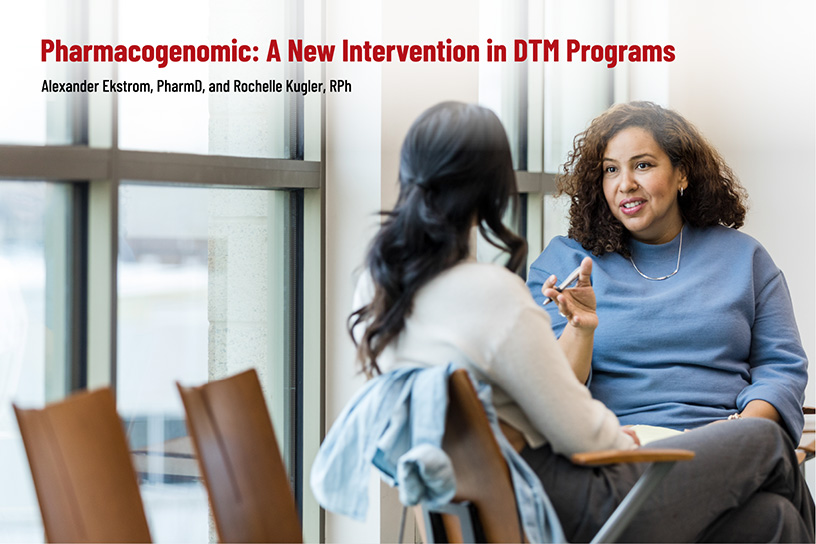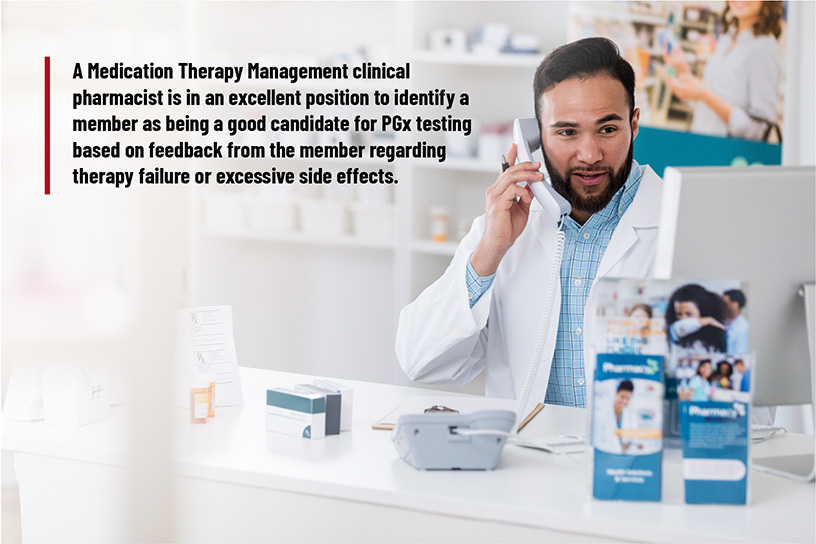Pharmacogenomic: A New Intervention in DTM Programs
February 5, 2025

In early 2023, PerformRx launched an innovative pilot program in collaboration with Xact Laboratories and a Michigan Medicaid plan. This initiative integrated pharmacogenomics (PGx) into a Drug Therapy Management (DTM) program for members with cardiovascular conditions. The goal? To optimize medication therapy, reduce adverse drug events (ADEs), and usher in a new era of personalized medicine. According to the Centers for Disease Control and Prevention (CDC), non-optimized medication therapy costs the U.S. healthcare system approximately $528.4 billion annually.1 PerformRx’s pilot program aims to address this challenge by pairing pharmacogenomics with pharmacy benefit management (PBM) systems to deliver better health outcomes.
What Is Pharmacogenomics?
Pharmacogenomics studies how an individual's genetic makeup influences their response to medications. By analyzing a patient’s genetic profile, healthcare providers can make more informed decisions about drug selection and dosing to enhance efficacy and minimize adverse effects. Over 300 FDA-approved therapeutic products now include PGx information in their drug labeling, representing a significant increase from 100 products in 2020.2 This rapid growth underscores the rising importance of pharmacogenomics in modern healthcare.
How Pharmacogenomics Enhances Medication Management
PerformRx’s pharmacogenomics program demonstrates the potential to revolutionize medication management. Key areas of impact include:
- Medication Selection: Pharmacogenomic testing can reveal genetic variations that impact drug effectiveness. For instance, changes in the CYP2C19 gene can render the antiplatelet drug Plavix® (clopidogrel) ineffective, increasing the risk of heart attack or stroke. By identifying such variations, healthcare providers can prescribe more effective alternatives.
- Dosage Adjustment: Genetic factors influence how individuals metabolize drugs. For example, variations in the VKORC1 and CYP2C9 genes affect how the anticoagulant warfarin is processed, potentially leading to overdosing (bleeding risk) or underdosing (clotting risk). Pharmacogenomic testing enables safer, more precise dosing.
- Adverse Event Risk Reduction: Statins, commonly used to lower cholesterol, can cause muscle pain or, in rare cases, severe complications like rhabdomyolysis. Variations in the SLCO1B1 gene can predispose individuals to these side effects. Pharmacogenomic testing helps identify at-risk patients, enabling providers to adjust dosages or select safer alternatives.
- Enhanced Medication Adherence: By minimizing side effects and improving drug efficacy, pharmacogenomics encourages patients to adhere to their prescribed therapies.
- Early Intervention: Genetic testing can identify individuals predisposed to conditions like hypertension or coronary artery disease. Armed with this knowledge, providers can implement lifestyle modifications and preventive measures to reduce cardiovascular risks.
Real-World Impact: A Patient Case Study
A 76-year-old male with a history of stroke, high blood pressure, and other chronic conditions participated in the pilot program. Pharmacogenomic testing revealed two critical findings:
- CYP2C19 intermediate metabolizer genotype — Reduced effectiveness of clopidogrel, increasing the risk of cardiovascular events.
- Decreased SLCO1B1 transporter function — Increased exposure to simvastatin, heightening the risk of muscle-related side effects.
Based on these results, a clinical pharmacist recommended switching clopidogrel to ticagrelor and simvastatin to rosuvastatin. The cardiologist accepted these recommendations, leading to improved medication safety and efficacy.

Overcoming Challenges in Pharmacogenomics
While promising, pharmacogenomic programs face several hurdles:
- Cost: Although the cost of PGx testing is decreasing, it may still be perceived as an additional expense.3 However, avoiding trial-and-error prescribing, emergency visits, and hospitalizations makes PGx testing a cost-effective option in the long run.
- Accessibility: Educating members and providers about PGx testing is time-intensive. Community-based engagement, such as offering testing through local pharmacies or healthcare providers, can improve accessibility.
- Data Integration: Seamlessly integrating PGx data into electronic health records (EHRs) and pharmacy claims systems is essential. Standardized processes are needed to ensure continuity of care if members switch health plans or providers.
The Future of Pharmacogenomics in PBMs
As technology advances, pharmacogenomics is poised to become a cornerstone of personalized medicine. Organizations like the American Society of Health-System Pharmacists (ASHP) advocate for incorporating PGx into clinical practice, empowering providers to develop individualized, precise, and safer treatment plans.4 For PBMs, pharmacogenomics represents a unique opportunity to enhance services like Medication Therapy Management (MTM) and adherence programs, driving better outcomes for members and clients alike.
PerformRx’s pilot program demonstrates the transformative potential of pharmacogenomics. By leveraging genetic insights, PBMs can move beyond a one-size-fits-all approach, delivering personalized care that optimizes medication use, reduces costs, and improves patient outcomes.
When implementing pharmacogenomics, continuous monitoring is essential to assess clinical response and prevent ADEs. While challenges remain, the future of pharmacogenomics within PBMs is bright, promising a new era of tailored healthcare solutions.
References:
- Ann Pharmacother, 2018 Sep;52(9):829-837. doi:10.1177/1060028018765159. Epub 2018 Mar 26.) https://pubmed.ncbi.nlm.nih.gov/29577766/
- Crutchley, R., 2022, Personalized Medicine and the Future of Pharmacogenomics, Washington State University, 10/27/2023, https://pharmacy.wsu.edu/2022/02/11/personalized-medicine-and-the-future-of-pharmacogenomics
- Berndt, E.R. , Goldman, D.P. & Rowe, J. The value of pharmacogenomic information. In Economic Dimensions of Personalized and Precision Medicine 53–86 (The University of Chicago Press, Chicago, IL, 2019)
- Am J Health-Syst Pharm. 2022;79:704-707

Sign Up for Updates
Receive updates from PerformRx about the latest blog posts, news announcements, upcoming conferences and more.
Sign up